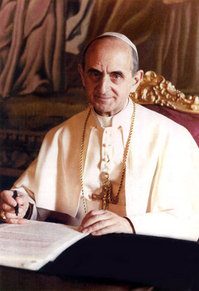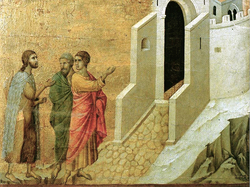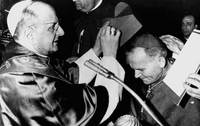When Paul VI Saved the Church from Disaster: An interview with Fr. Luigi Giussani
Q: Paul VI died in August of 1978, and then came pope Albino Luciani. Then there was the arrival of the "pope who came from far away." Do you remember the hours during which the death of Paul VI was announced?
A: I remember those moments. [...] The Church had been plunged into such a condition that the loss of that guide seemed extremely serious to me. It had been Paul VI who, in all good faith, had looked favorably upon a certain evolution of the Church. But his love for the Church was so genuine that, at a certain point, he had to realize the disaster posed by the dynamic of things - even though these things had been approved [by him]. It was then that he opened himself completely to the experience of Communion and Liberation. So the death of Pope Montini was like the disappearance of a possible guide. He had seen and made confirmation; he knew the inner workings of that process of destruction. Now, he intended to go against the tide: and he was the best choice and the one most able to do it.
 Q: When did this new intention of Paul VI come about?
Q: When did this new intention of Paul VI come about?
A: It dates from his famous 'Credo', June 30, 1968, which began the shift. Humanae Vitae and the outrageous attacks to which he was subjected confirmed him in his judgment. The culmination of his disillusionment came with the referendum on divorce in
Q: And then how did it go?
A: [...] After the mass, it was about noon, and I heard a prelate call me: 'Fr. Giussani, the pope wants to see you.' I was in the portico of Saint Peter's Basilica, I had the ciborium with the consecrated hosts in my hands, and I heard that voice. In the emotion of the moment I tried to hand over the ciborium to a halberdier, who drew back. Finally I was able to hurry toward the pope. I appeared before him right at the door of the church. I knelt down, I was so confused... I remember precisely only these words: 'Have courage, this is the right way: keep going forward.'
Q: Was this something unexpected?
A: Totally unexpected. But these were not improvised words of encouragement. [Years later] I received sure proof of this from Cardinal Benelli, the closest hierarchical collaborator of Paul VI. He told me in person that each time he visited Pope Montini during the last years of his pontificate, the pope asked him about Communion and Liberation. And he told him: 'Your Eminence, that is the way.' Benelli made this comment to me: 'If Paul VI had lived another year, I assure you that all your ecclesiastical problems would already have been resolved.' Paul VI would have had the courage to say so, and to do it. [...] One noteworthy confirmation of the change in Paul VI was evident in his dismissal from the supervision of Catholic Action of his close friend Bishop Franco Costa, who had determined the course of Catholic associations over the previous decades.
Q: Did Paul VI's old collaborator also mean by those words to express a specific judgment about the Church?
A: [His words] signified affirmation of the soundness of CL's inspiration, of its validity for the Church. And this was in view of the profile of all Catholic associations during those years, which in their leadership bodies voted and directed voting [in the referendum on divorce] not in accordance with the pope's wishes. The approach of 'religious choice' had led Catholic associations to take refuge in all sorts of leftist politics: and there they pushed for divorce, among other things, without any qualms.
Q: On September 8, 1977, Paul VI spoke to his friend Jean Guitton about 'a non-Catholic type of thought' and the resistance of a 'small flock.' For years you have wanted to have these words repeated so that they could be known to everyone. Why?
A: Because that is what is happening. Please read me those words again.
 Q: Here they are: There is a great disturbance at this moment in the world and in the Church, and what is in question is the faith. It happens now that I find myself repeating the obscure saying of Jesus in the Gospel of Saint Luke: 'When the Son of man returns, will he find faith on the earth?' It happens that books are published in which important points of the faith are undermined, that the bishops are silent, that these books are not found to be strange. [...] What strikes me, when I consider the Catholic world, is that a non-Catholic type of thought seems to predominate sometimes within Catholicism, and this non-Catholic thought might become the stronger one within Catholicism in the future. But it will never represent the thought of the Church. A small flock must remain, however small it may be.
Q: Here they are: There is a great disturbance at this moment in the world and in the Church, and what is in question is the faith. It happens now that I find myself repeating the obscure saying of Jesus in the Gospel of Saint Luke: 'When the Son of man returns, will he find faith on the earth?' It happens that books are published in which important points of the faith are undermined, that the bishops are silent, that these books are not found to be strange. [...] What strikes me, when I consider the Catholic world, is that a non-Catholic type of thought seems to predominate sometimes within Catholicism, and this non-Catholic thought might become the stronger one within Catholicism in the future. But it will never represent the thought of the Church. A small flock must remain, however small it may be.
A: These words are the synthesis of the pope's reflection on the situation and destiny of the Church. This is where his openness to CL comes in.
Q: Is there some strong doctrinal point that you feel to be central to the magisterium of Paul VI?
A: The affirmation, completely against the tide, of the Church as an 'ethnic identity sui generis.' On July 23, 1975, it was the heart of his preaching on the identity of the Church at the Wednesday general audiences. We were almost the only ones to take up this idea. Paul VI sensed the destruction of the Catholic presence in society. This presence was hiding itself. Or rather, instead of a Catholic presence, there was an increasingly tired and abstract closing in upon oneself in the offices of the associations, while the concrete lives of the young people themselves lined up to follow the current ideas. Or, instead of the Catholic presence, there was intellectual interpretation in the manner of the Democratic League, of the university students of the FUCI, of the Catholic Alumni. These theorized a conception of the faith that was absolutely elitist, and suicidal for mission. In the third place, the position of the Church came to be identified with political and diplomatic cunning. In any case, I believe that the news about the situation of the Catholic universities, institutes, and schools of theology was decisive in showing clearly to Paul VI the abyss toward which the Church's leadership was dragging everybody else.
Q: Some observers judge the pontificate of Paul VI as a failure.
A: The papacy of Paul VI was one of the greatest papacies! He had demonstrated during the first part of his life an extreme sensitivity for all the problems of the anguished condition of modern man and society. And he found a response! He gave this response during his last ten years. The papacy of Paul VI is a failure only to someone who has not thoroughly examined it.
Q: He is the pope who concluded Vatican Council II.
A: Of course. A history should be compiled of all the courageous, and unpopular, contributions he made to stop false democracy, the dogmatic equivocation that many Council Fathers tried to pass off under a democratic pretext.
Q: What was the method of Paul VI in the face of the dissolution of the Catholic people, the disappearance of the multitudes?
A: It was that of the 'Credo.' This is as much as to say the authentic proclamation of dogma, sine glossa, with clarity, and of the presence of the Church in the world, as in his speech on the Christian people on Wednesday, July 23, 1975.
Q: Paul VI was targeted for his rediscovery of the devil as an actor in human affairs. He was even left alone by the bishops.
A: Pope Montini began to realize the disaster into which the Church was sliding when he noticed the formalism with which the supernatural was considered and represented. For this reason, his speech on the presence of the devil in the world was a challenge - and such a courageous one that it could not have been foreseen in light of his temperament - to the world and to all theology, including Catholic theology, that was coming to agreement with the world.
A: During that month of August, 1978, with one pope dead and another dying, what were you hoping for the Church?
A: A man who would continue an intuitive understanding of the tragedy in which the
 Church was submerged. And of the only remedy, which is that of returning to faith in the supernatural as the determining factor in the Church's life, to the authenticity of tradition. In short, I was hoping for a pope who would continue on the way that Paul VI, during his last years, had vigorously pointed out. [...] In the end, John Paul II emerged: a pope who is the incarnation of what the last ten years of Paul VI had intuited and expressed.
Church was submerged. And of the only remedy, which is that of returning to faith in the supernatural as the determining factor in the Church's life, to the authenticity of tradition. In short, I was hoping for a pope who would continue on the way that Paul VI, during his last years, had vigorously pointed out. [...] In the end, John Paul II emerged: a pope who is the incarnation of what the last ten years of Paul VI had intuited and expressed.


Leave a comment